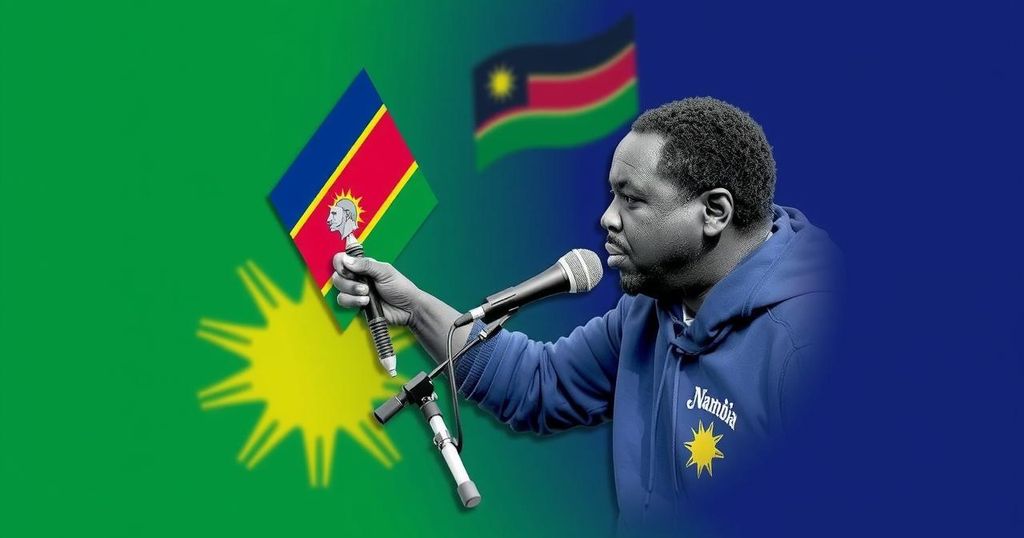World news
AFRICA, ALLIANCE DU CHANGEMENT, ALLIANCE LEPEP, BDP, BOTSWANA DEMOCRATIC PARTY, DEMOCRACY, ELECTIONS, GOVERNANCE, GOVERNMENT, MAURITIUS, MILITANT SOCIALIST MOVEMENT, NAMIBIA, NET, NETUMBO NANDI - NDAITWAH, OPPOSITION, PARLIAMENTARY SEATS, PR, PRAVIND JAGNAUTH, SAHARAN AFRICA, SWAPO
David O'Sullivan
0 Comments
Namibia Elections: SWAPO Faces Significant Losses Amid Increasing Voter Dissent
Namibia’s SWAPO party retained power but suffered significant parliamentary losses, reflecting a broader trend in sub-Saharan Africa, where incumbents face increasing voter dissent driven by economic issues and public outrage against corruption. The rise of organized opposition has resulted in notable electoral victories and a push for democratic accountability across the continent.
Namibia’s ruling party, SWAPO, has managed to maintain its grip on power after over three decades, yet has experienced a significant transition as it faces increasing voter dissent. Official results indicate that Netumbo Nandi-Ndaitwah, the SWAPO candidate, secured victory in the presidential elections with 57% of the votes, making her the first female leader of the nation. Despite this retained power, the party suffered substantial losses in parliamentary elections, losing 12 out of its 63 seats, raising questions about these contrasting results. Opposition groups have challenged the election’s legitimacy citing logistical issues and irregularities as key factors undermining the electoral process.
This year has been particularly challenging for numerous incumbents across sub-Saharan Africa, echoing a broader trend wherein governing parties have faced significant setbacks. Driven by economic decline, increasing public outrage against corruption, and the rise of organized opposition parties, many governments have found themselves losing ground. Examples of these electoral shifts include the Botswana Democratic Party, which was decimated in the most recent elections, and the governing coalition in Mauritius that lost power dramatically. Not only are governing parties losing power, but even those that have managed to retain it, like South Africa’s ANC, are grappling with diminished political strength. Public discontent is heightened by economic pressures—such as inflation and mismanagement—which have mobilized citizens against their governments.
The political landscape in Africa has demonstrated a pronounced resilience, marked by a surge in voter mobilization and the unification of opposition factions. In Mauritius and Botswana, these coalitions were able to secure transformative victories by capitalizing on governmental failures regarding economic management and civil liberties. This pattern raises concerns for countries such as Ghana and Malawi, where ruling parties may face similar electoral challenges in the near future. Overall, the wave of opposition victories and the push for greater accountability reflect a growing citizen engagement and a proactive civil society, signaling a potential shift towards more democratic governance in the region.
The article examines the electoral landscape in Namibia following the recent elections where SWAPO, despite retaining power, faced significant losses, mirroring trends in other countries in sub-Saharan Africa. As traditional governing parties encounter challenges from organized opposition, multiple factors including corruption, economic hardship, and increased civic engagement are driving this political shift. The broader implications reveal emerging democratic resilience amidst a global backdrop of declining democratic governance.
In conclusion, the recent electoral developments in Namibia and across sub-Saharan Africa illustrate a significant transformation in the political dynamics of the region. This year has witnessed a noticeable decline in support for ruling parties, as evidenced by substantial losses and opposition victories. The persistent issues of economic mismanagement and corruption, coupled with rising public activism, suggest that African nations are witnessing a period of increased political engagement and democratic resilience that merits global attention.
Original Source: www.bbc.com




Post Comment